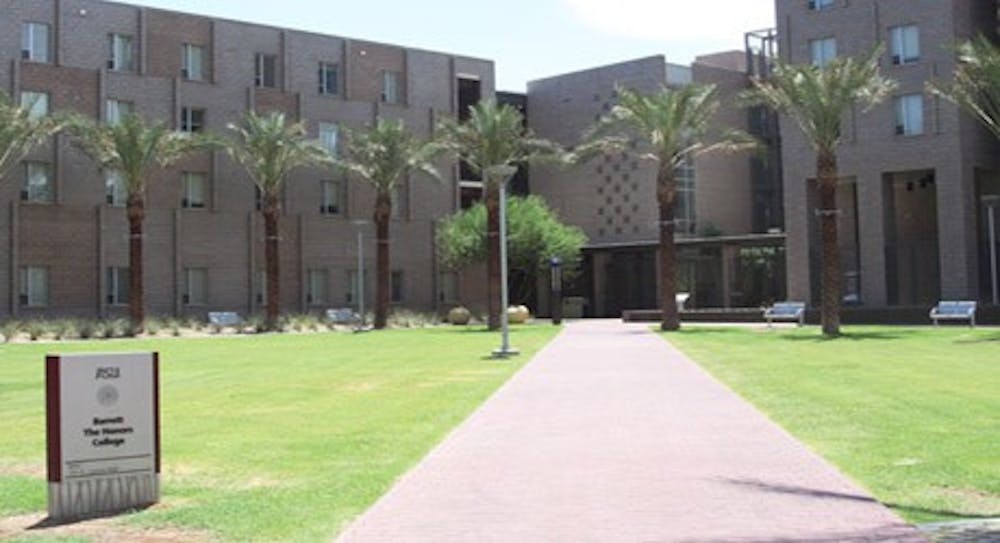The term “gifted student” can produce a variety of definitions from different people, but one current consensus from several ASU faculty and students is that not all gifted students are at Barrett, the Honors College, and the college is available to more students than the stereotypical “gifted” population.
According to the National Association for Gifted Children website, the term gifted applies to “students who give evidence of high achievement capability in areas such as intellectual, creative, artistic, or leadership capacity, and who need services and activities not ordinarily provided by the school in order to fully develop those capabilities.”
Jo Ann Martinez, the coordinator of Barrett Summer Scholars, an academic program for gifted middle school students held at ASU, said she follows the state’s definition of a gifted student.
“According to the state, they measure whether a person is gifted or not by a cognitive intelligence test that they take,” Martinez said.
She said she encourages middle school students to go to Barrett when they’re older “for that extra challenge that they can get with an honors education.”
“We know that these students have the capacity to be challenged at a greater level [and] to think more critically,” Martinez said.
She said tests and intelligence are not the only factors in success at Barrett and that there needs to be a “desire to want to succeed, knowing how to access resources and tools and asking for help.”
Students who are not labeled “gifted” by tests aren’t necessarily left out of Barrett, she said.
For example, some schools might not have provided resources or tests to determine whether students were gifted.
Dean Mark Jacobs of Barrett, the Honors College, said he still doesn’t know what Americans mean when they refer to someone as “gifted.”
“It seems to mean something different to almost everybody,” Jacobs said.
He said some schools look at grades or test scores.
“We don’t make that distinction at the honors college,” Jacobs said, because the application considers an essay and letters of recommendation along with academic scores.
“Simply scores don’t predict how successful they’re going to be in the sense of following through, staying in Barrett and completing their thesis,” he said.
He said there are probably some people at the college who fit the test-score definition of gifted, but they are mainly defined in a different manner.
“I don’t think it’s a matter of students in Barrett necessarily being smarter by some test score than other students,” Jacobs said. “I think they’re more dedicated to the idea of challenging themselves…they just work in a different way.”
However, he said he thinks most of the students probably have taken accelerated, advanced placement or honors courses in high school.
“If the classes are available in your high school…and you haven’t taken them, it’s unlikely you’ll get into Barrett,” Jacobs said, because it’s suspicious, considering they had the opportunity to challenge themselves and didn’t take that chance earlier.
“Grad schools think the same way,” Jacobs said. “If they look at an ASU student who has the same law school board score as an ASU student who’s also a Barrett student…they might say, ‘Well, if this student who’s at ASU but not in Barrett could have been in Barrett, why wasn’t she in Barrett?”
He said they’ll think she could’ve pushed herself but decided not to.
Students have told Jacobs that the honors college is just extra work, but there are also added benefits, he said.
“If a student sees working on a thesis…as extra work they don’t want to do, then they shouldn’t do it,” Jacobs said. “A student who wants the challenge of grappling with a topic for an entire year…would want to do it.”
The thesis Barrett students are required to complete shows future employers they worked on a project for an entire year, he said. It also shows a student’s true character, he added.
“It shows the person that they can do a sustained piece of intellectual work and be successful and get it done,” Jacobs said.
“Learning that before you graduate from college can be very valuable.”
Other benefits of attending Barrett are honors student funds for summer study abroad classes and meetings.
Barbara Colby, the assistant dean for academic affairs in the College of Liberal Arts and Sciences, doesn’t consider a gifted student to be defined through test scores.
“What I think is a gifted student is somebody who is willing to learn new things, even though it may shake up his or her preconceived notions,” Colby said. “It takes a lot of guts for students to do that…the student who dares to challenge the accepted views of things is really gifted in that sense, because they can go far.”
She said Barrett offers different opportunities, smaller classes and nice living quarters, and it could be considered a more organized environment.
However, she said it’s not for everyone, and there are students who could be considered gifted who are not in Barrett.
There are students who decided to drop out of Barrett because it wasn’t a good fit and they felt constraint, and there are others who do well, stay and are comfortable, she said.
“What’s really nice about ASU is the kind of university it is,” Colby said. “It doesn’t ever block people from changing their views and their options.”
She doesn’t think all students in Barrett are considered gifted in the sense that “things come easily” to them, and that some are just hard workers and dedicated.
Some gifted students “in the flattest sense of the word” don’t do well and “flounder and waste time” because they’re not focused, Colby said.
She said she encourages students to look into opportunities Barrett and ASU offer overall.
“I feel sorry for the student who comes here and thinks there’s ‘Major X’ and just stays with that and just leaves four years later, because they haven’t experienced all the things that they could and they haven’t thought about them,” Colby said.
Natalie Young, a psychology senior, has been at Barrett since her freshman year.
She considers a gifted student as “someone who can work with accelerated material.”
Reach the reporter at reweaver@asu.edu





